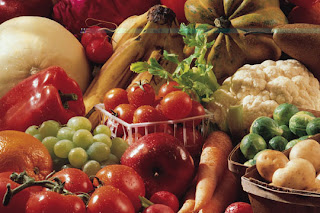Vitamin B has eight types, namely vitamin B1, B2, B3, B5, B6, B7, B9, and B12. Less consumption of vitamin B can cause various diseases. That is why many multivitamin that includes vitamin B variations of the type called vitamin B-complex. Here is an explanation of the types of vitamin B.
Vitamin B1 (Thiamine)
Function : Change the carbohydrates in foods into energy.
Needs : Women 1.1 mg, Men 1.2 mg, Pregnant and nursing women 1.4 mg.
Sources : Rice, bread, cereals, flour, seafood such as shrimp, crab or shellfish.
Vitamin B2 (Riboflavin)
Function : Maintain healthy eyes and skin.
Needs : Women 1.1 mg, Men 1.3 mg, 1.6 mg for lactating women.
Sources : Milk, cheese, chicken, broccoli, spinach, mushrooms.
Vitamin B3 (Niacin)
Function : For healthy skin, increase appetite, improve digestive system and help convert food into energy.
Needs : Women 14 mg, 16 mg Men, 18 mg Pregnant women: 17 mg for lactating women.
Sources : Grains, beans, beef, mushrooms.
Vitamin B5 (Pantothenic Acid)
Function : Together with other types of vitamin B, vitamin B5 is useful in the breakdown of fats, proteins, carbohydrates into energy. Another benefit is to make red blood cells and make vitamin D.
Needs : Women 4 mg, Men 6 mg, 5 mg Pregnant women.
Sources : Chicken, sardines, avocado, watermelon.
Vitamin B6 (Pyridoxine)
Function : Required in the process of amino acids and fats.
Needs : Women 1.3 mg, Men 1.3 mg 1.9 mg Pregnant women, 2 mg for lactating women. Most of the consumption of vitamin B6 with the consumption of more than 50 mg per day can cause permanent nerve damage.
Sources : Meat, poultry, fish, beef, potatoes, tomatoes, bananas, fruit purple and green vegetables.
Vitamin B7 (Biotin)
Function : Helps in the breakdown of fats, proteins into energy used by the body.
Needs : Women 25 meg, Male 30 meg, Pregnant women 30 meg.
Sources : Salmon, eggs, milk, cereal, bananas and peanuts.
Vitamin B9 (Folate)
Function : In order for the cells in the body is well developed, forming red blood cells and prevent nerve damage in the fetus.
Needs : Women's 400 meg, Men 400 meg, Pregnant women 600 meg, Lactating 500 meg.
Sources : Milk and dairy products, melons and green leafy vegetables.
Vitamin B12 (Cobalamin)
Function : Change the carbohydrates, proteins and fats into energy, maintain healthy red blood cells, protects nerve cells, preventing cardiovascular disease, and prevent brain shrinkage that can lead to weakened memory.
Needs : Women's 2.4 meg, Men 2.4 meg, 2.6 meg pregnant women.
Sources : Beef, fish, eggs, milk, soy and seaweed.
Processing Vitamin B
In the process, should not be boiled. It is recommended to process using microwave or by steaming. This is because vitamin B is easily soluble in water and easily damaged if heated. Instead, store food sources of vitamin B in the cold in the refrigerator so that this vitamin is maintained.
Although the amount needed by the body is not too much, but beneficial to the body of vitamin B, especially in helping the bodies get energy. By knowing the various types with different benefits, you can try to make enough vitamin B requirement for the body.

This is good thing to know about different types of vitamin b. And well there are a lot and each has its different roles to our overall health. Currently i'm using a liquid form of supplement for vitamin b12 that I bought from alternative health site.
ReplyDeletewhats best for depression????
ReplyDeleteSuper site! I am Loving it!! Will return once more, Im taking your food additionally, Thanks. vitamin c
ReplyDelete